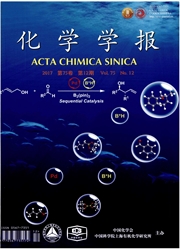

 中文摘要:
中文摘要:
通过表面引发的原子转移自由基聚合在硅片表面制备了聚(N-异丙基丙烯酰胺)(PNIPAAm)聚合物刷.用原子力显微镜(AFM)分别研究了PNIPAAm的接枝动力学、温度和溶剂性质对厚度的影响以及PNIPAAm链与原子力针尖间的粘附力.结果表明,PNIPAAm链在硅片表面的生长具有很好的可控性.常温下厚度为33nm的PNIPAAm膜在水溶液中的增加到82.4nm;而在甲醇/水(V∶V=1∶1)溶液中,PNIPAAm分子链处于坍塌收缩状态,厚度降低为45nm;在55℃下干燥所得厚度则仅为22nm.力-距离测量结果表明,在溶液中,PNIPAAm链与原子力针尖之间的粘附力远小于在干态下的粘附力.用石英晶体微天平(QCM-D)对PNIPAAm的可逆相转变进行了研究,结果表明PNIPAAm分子链随温度变化的构象转变是发生在30~34℃之间的连续过程.
 英文摘要:
英文摘要:
Poly(N-isopropylacrylamide) (PNIPAAm) brushes were prepared on silicon/gold surfaces using surface-initiated atom transfer radical polymerization of NIPAAm. AFM studies showed that the chain growth dynamics of PNIPAAm could be well controlled by the polymerization time. At room temperature, a PNIPAAm film with a thickness of 33 nm dried at room temperature increased its thickness to 82.4 nm in water as a result of extension of the PNIPAAm chains. On the contrary, the PNIPAAm chains collapsed in 1∶1 (V∶V) water/MeOH solution, leading to a film thickness of 45 nm. When the film was dried at 55 ℃, a more severe chain collapse occurred, resulting in a thin thickness of 22 nm. Moreover, the adhesion force between the PNIPAAm chains and AFM tip in solution was far smaller than that in air, demonstrating that the adhesion force at the collapsed state is larger than that at the extended state. The results of quartz crystal microbalance showed further that the PNIPAM brushes exhibited a continuous collapse over a temperature range of 24~42 ℃.
 同期刊论文项目
同期刊论文项目
 同项目期刊论文
同项目期刊论文
 期刊信息
期刊信息
